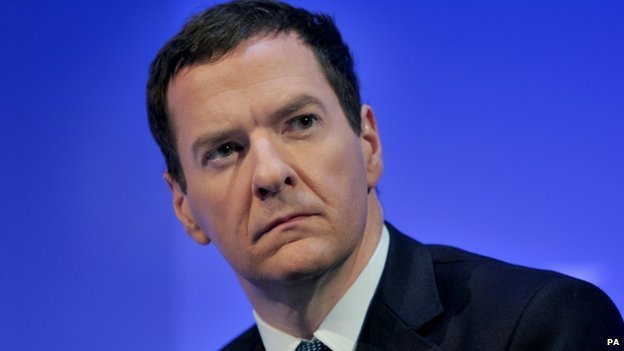Corporation Tax In NI: Chancellor Says Devolution ‘Dependent On Talks’
The chancellor has announced that any decision on devolving corporation tax to Northern Ireland will be dependent on the outcome of the all-party talks.
George Osborne said the power could be devolved “provided the Northern Ireland Executive can show that it is able to manage the financial implications”.
He added if the talks succeeded, the government would introduce devolution legislation before May’s election.
Corporation tax is what companies pay on their profits.
More competitive
Northern Ireland’s First Minister Peter Robinson welcomed the approval “in principle” from the chancellor and said it was the “failure of the other parties” that had caused the delay.
“The DUP have taken all the necessary hard decisions relating to the economy, welfare reform and the budget,” he said.
“Let us be clear. If Sinn Féin and the SDLP had been prepared to agree the DUP enhanced welfare reform proposal and if the SDLP, UUP and Alliance had been sufficiently mature to take the difficult decision to support the draft budget we would have been moving to legislate for corporation tax powers to be devolved on Monday.
“If this opportunity is lost they will have to explain why they failed to behave in the best interests of our people and why they have rejected the opportunity to create up to an additional 50,000 jobs here.”
However, the SDLP has warned about the “negative effect” the relationship between the DUP and the Northern Ireland Office is having on the talks process.
Alex Attwood MLA said the party had written to the secretary of state expressing concern about the “cosy relationship” she had with the DUP.
“If London keeps the DUP sweet and the DUP do London’s bidding then the talks will miss the opportunity to achieve all that they must,” he said.
“The next days must see London withdraw from its stand and deliver an approach on budget and welfare.”
line
Analysis by John Campbell, BBC News NI Economics Editor
“Like Waiting for Godot” is what a senior business figure told me about today’s announcement from the Chancellor.
There is satisfaction among campaigners that the argument for devolving the tax has been won and that it is now seen as practically possible.
But the latest delay, which clearly ties the power to the fate of the all-party talks, causes huge unease.
What exactly will the parties have to do to convince the Chancellor?
“A cynic might say this is a way to make sure it never happens,” my source added.
He will be hoping that the Waiting for Godot analogy is not followed to its conclusion.
In the Beckett play Godot said he would come “surely tomorrow.” But he never turned up.
line
Autumn Statement
At the moment, corporation tax is levied at a rate of 21% in the UK, although that will be coming down to 20% in April.
In the Republic of Ireland, the rate is just 12.5% which makes it more competitive than Northern Ireland when it comes to attracting foreign investment.
Supporters of devolution said tax-cutting powers would give a major boost to Northern Ireland’s economy, but sceptics said it would hit public spending with no guarantee of success.
Mr Osborne made the announcement in the House of Commons as part of his Autumn Statement.
He told MPs that the government recognised “the strongly held arguments for devolving corporation tax-setting powers to Northern Ireland”.
Welfare reform
However, he said Northern Ireland’s political leaders had to prove they were “able to manage the financial implications” of such a move, referring to the ongoing all-party talks that began in Belfast two months ago.
The talks, chaired by Secretary of State Theresa Villiers, are aimed at reaching agreement on a range of unresolved issues, including disputes over flags, parades, the legacy of the Troubles and welfare reform.
The five main parties have clashed over welfare reform in recent months, with Sinn Féin and the SDLP objecting many of the cost-cutting measures that have already come into force in England and Wales.
Unionists have argued that Northern Ireland must take difficult decisions to balance its budget, but nationalist and republican MLAs have said that many of the reforms will disproportionately disadvantage some of the most vulnerable people in society.
Spending cuts
If a deal is done at the all-party talks, Mr Osborne said the government would introduce legislation to devolve corporation tax before the next General Election, expected to be held in May 2015.
Stormont would then have to pass its own legislation, setting the rate and the precise rules, which will take up to two years.
European rules mean that any benefit Northern Ireland gets from a tax cut would have to be offset by a reduction in the amount it receives from the annual UK block grant.
That would probably mean at least £200m a year would have to be cut from public spending.
Last month, Prime Minister David Cameron said the argument made by Northern Ireland politicians for devolving corporation tax was strong.
‘Huge gamble’
However, the Green Party in Northern Ireland has said any potential cut to the rate of corporation tax in Northern Ireland would be “unfair and ill-advised”.
Assembly member Steven Agnew said: “The Green Party does not believe government should hand this power to Stormont at this present juncture, given the problems executive parties have had already managing their budgets.
“This is a huge gamble with public money and flies in the face of what should be happening in terms of raising revenue.”
Source: bbc.co.uk




